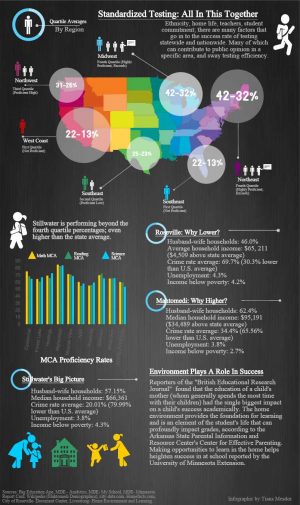Standardized testing helps for college but does not measure knowledge
October 21, 2015

Standardized tests are something considered unnecessary for proficiency and success among many high school students because of how they are found to cause minimal, but in most cases zero, impact on final grades. Little do students know, these ungraded tests play a large role in success prior to graduation.
Later into secondary education, students begin to question the relevance of standardized tests. In Minnesota, two tests that are commonly issued are the Minnesota Comprehensive Assessment (MCA) and the alternate test which is the Minnesota Test of Academic Skills (MTAS). These assess a school’s proficiency, but do not usually impact the student’s graduation potential, leading them to be perceived as rather redundant.
Testing and Relevance to Students
Testing is used in schools across the nation on a yearly basis. Even though this plays a large role in understanding personal success, students feel as if there is little to be learned from standardized assessments.
Junior Emera Balok said, “I personally don’t see them as something that helps me, they are more of a nuisance I think; I have not taken a standardized test and gotten anything out of it. And a lot of other people view them as a nuisance too. There is not much stress associated with it, it’s just that most people don’t want to have to take them.”
Not only are the MCA’s used for federal accountability, but they help measure student proficiency and success. State tests are given to students in a district usually once a year, based on their grade and subject, differing from normal tests, which are given by teachers more regularly. Both types of tests give educators an idea of how well students are learning the concepts taught to them in the classroom.
Stacey Bartlett, a science teacher, whom used the MCA science test as her 2015 general biology final said, “Tests don’t count for graduation, so why would anyone care! Students are only forced to care if we make it the final, but it is not really useful information for us if students don’t try. So as long as students are trying, I feel like it is a good tool for teachers because it tells you what your students know and don’t know. But if students are not trying then it is pointless. So why should students care?
She added, “Well if their teachers make it a final, they should care. But if not a final, it is really good practice for the ACT and I think they should take advantage of that opportunity for free practice. Because it is still a standardized test, and the premise is very similar to the ACT. It is not timed, so there is not that pressure, but they are set up very similarly. Although in high school I may have not felt this way; it is an opportunity to practice.”
Tests Assist in Success
In short, if students do not try, there is no clear way to judge the success of a school. Not only can these tests help prepare students for the success on a college entry, but the skills shown on the test can directly correlate to how teaching is altered in the classroom. Students need to pay attention in class and receive good grades to acquire a proficient score on a standardized test, which can help correlate to a good score on a college entry exam.
Bartlett added, “We know the benchmarks, they are no secret. Following the state benchmarks, the guidelines for what you should be teaching, prepares students. I always make my own study guides and I prepare my students by writing my tests and pretests in a form similar to the MCA and ACT tests. So I feel like maybe my students have a little bit of an edge not related to biology because I spend a lot of time preparing my students for a standardized test. I don’t know if it is fair or not because not everybody has that emphasis. But I believe those are the things that make you successful, making sure your teacher follows the benchmarks, having savviness with a standardized test and having students take it seriously- leading to positive effects.”
Standardized testing plays a large role in student success. Although students feel these tests are redundant, SAHS generally falls in the higher percentile, earning 65-72 percent proficiency rates on each category of test (reading, science, math) during 2015. There is a phenomena regarded as “teaching to the test” in which schools with high proficiency rates have been accused of taking the creativity out of the curricula to simply teach the state benchmarks, leading to discussion over completely removing tests altogether.
Importance of Testing to the School
Angela LaBounty, Director of Learning Analytics and Systems Improvement for Stillwater Schools District said, “There are lots of exciting conversations already happening among educational researchers on this very topic [ending standardized tests and the potential impact]. I mean, let’s get real: no student is going to be asked to bubble in answers or select from choices A, B, C, or D in their jobs, right? It is so important, however, that we create learning experiences in our schools that move past whether a student simply knows something or not…and get ourselves to a place where we can see what a student can actually do with that knowledge.”
She added, “Are we preparing our learners to creatively problem solve? To think critically about situations they face? To be able to construct an argument and defend their thinking? Do our students leave Stillwater knowing how to collaborate and work effectively with others? The truth is that, given the capabilities of Google and Siri, we can find the answer to almost anything within seconds. However, we need to be sure that our students can actually make meaning from that knowledge and transfer it to practical uses in the real-world.”
Aside from the importance of these tests for the future, another heavy impact of students future success is the teacher. In a survey, done by “My Voice: Students Aspirations”, 38 percent of students think their teachers enjoy teaching. No matter what you teach, it can be presented to students in an exciting way. Only 31 percent of students surveyed believe that their teachers make school an exciting place to learn. Regardless, majority of students do believe that their teachers help their learning experience and make the environment positive. But, there is a small percentage who believes teachers do not, showing that teaching does play a role in success.
LaBounty added, “No standardized test can measure a student’s ability to be curious, to be critical thinkers, to be creative, or to collaborate. While we do need to adhere to state testing requirements, and there can be good purpose for them, we can simultaneously create learning experiences and spaces for our students to be best prepared to think and meaningfully contribute to society outside of their school environment.”
The outcome of a student’s success is a two-way street. A student’s commitment and drive to try in school can help determine true test results in which can alter teaching. Once teaching is altered, and the environment is engaging, a student can learn better. Standardized tests play a large role in teachers ability to improve the environment for the best of success.
“Look at these tests as an opportunity, I mean you have to sit through the test anyway, so why not use it as practice for a test that is going to be very high stakes, because most of these are very low stakes. You don’t need them to directly graduate, so take advantage of the low stakes opportunities so you’re not ‘practicing’ on the high stakes opportunities.” Bartlett said.







